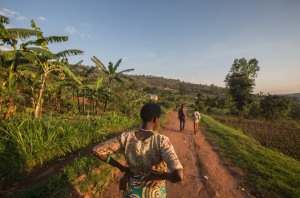On Friday, I went to my regular money-changing place. As I was walking in, there was an older woman leaving. She was the picture of an umuchechero, head and body wrapped in kitenge, leaning on a tall, thin stick, her face wrinkled and kind. She was also poor: She didn’t seem to have many teeth, and her plastic shoes were falling apart in all places. Someone in the money office handed her a few hundred francs.
I have a soft spot for old Rwandan women. You don’t see them too often, first of all, even among the people asking for money. You see young women with babies on their hips; you see kids who tell you they’re hungry but really want a Coke. Older women, especially those asking for help, aren’t part of the Kigali landscape.
The woman paused in front me; the pause was clearly the request. I had 200 francs in my coin purse, but that felt totally wrong somehow. I handed her a purple 2000-franc bill, or about $3.50.
She literally leapt with excitement. She went in for a hug, and I tried to oblige but hugged the wrong direction, and we clashed awkwardly. She took hold of me as strongly as she could — and she was thin and frail, so that isn’t saying much–and then tapped my forehead with hers. She was smiling, toothless indeed, and talking excitedly, and quickly. I only understood, “Murakoze,” thank you. I smiled back.
As she walked away, a man asked me, “Did you understand what she said?” I shook my head. “She said, ‘May all the blessings of God be upon you always.'”
It shook me, this effuse emotion in public, so un-Rwandan. And all blessings, always? For $3.50? A veritable bargain.
It’s not as if I were being particularly beneficent. I could have handed her the 5,000 franc bill in my purse. I don’t know why I didn’t, though I wonder now if that would have crossed a line, embarrassed her in some way. On the other hand, it’s more than double what I gave her, and she probably would’ve liked that. Hell, I could have given her both bills.
But the scene on either end was this: I was walking into this office to change $500 in cash. Thirty minutes later, I spent more than I gave to her on my lunch.
That afternoon, I came home and looked at a few email exchanges, expats selling goods to other expats, sometimes at pretty hefty markups. And I became furious. But at whom, I’m still not exactly sure.
Everywhere I’ve been in Africa, we mzungus roll our eyes and sigh about the ‘expat economy.’ That’s the one where meals out almost cost what they do back home, and car rentals cost as much or more. Rents are higher than you’d ever imagine. But we expats have cash to spend, and spend it we do. And up the prices go. It’s like a nice little fugue. Us self-funded folks, here without the cushion of the UN salary or housing stipend, hate it. Not because of the disparity to the local economy, but because the well-padded NGO world makes it harder for us little guys to afford even to be in the place.
Of course, even we indie types have got it made next to the old Rwandan woman.
We’re paying $100 a day for the privilege of being driven around in a car… We’re selling laptops and cell phones to each other at markups… Meanwhile, I can’t imagine where this woman sleeps, how in the world she’s going to eat, how she makes it through a day.
I’m not an economist. I bet one would try to tell me that a rising tide lifts all boats. But I’m not sure the mzungu yachts and the dugout canoes are riding the same tide.
And I’m having a damn hard time keeping my head straight, surfing between them.





Sharp and honest post. I’m a UNer meself, but in Kabul, and I can’t tell you the guilt it generates. When I went to open up my local bank account to stream dollars through to pay my higher-than-back home housing fees, the lady looked at my salary letter, dropped her jaw, and proceeded to inform me what a disgrace this was: that I should leave some of this money for the people of Afghanistan.
Could I convince her what with my six figure education debt, housing costs, medevac insurance, the more expensive than back-home meals? Wouldn’t even dare to convince myself of such lameness.
Are rich-country foreign workers in any developing country doing more good than harm, regardless of salary source? Not so sure about this. The moral economy of income is a tough one. But the ambiguity at least gives us fodder for blog posts, doesn’t it.
“I bet one would try to tell me that a rising tide lifts all boats. But I’m not sure the mzungu yachts and the dugout canoes are riding the same tide.”
I have several friends in America (white, middle class, took an Economics class or three at our liberal arts college), who swear that wealth creation (in a sort of ex nihilio manner is possible and that a rising tide does truly lift all boats.
But, after living in Africa for almost a decade, and then traveling throughout Central and East Africa, and from reading a newspaper every once in a while, I no longer believe that. I believe there is one pie, and when someone gets a bigger slice, it means someone is getting a smaller slice. I don’t think we can just keep making more pies, because there is a finite number of apples.
And, when it’s high tide in New York harbor, it’s probably low tide in Mombasa, or Mogadisho, or Luanda.
I’ve had few occasions to feel worse about myself as a human being than when someone on the grounds of the Gisenyi District Hospital asked me how much my cameras cost…
Thanks, Chris and Greg, for being so open.
Chris, I love the way you put that, “the moral economy of income.” Yeah, I have no answer. Just my little blog post. But I hear what you’re saying on all the things you can’t explain.
And, Greg, also on that camera thing. Oy.
I was about to say there’s no easy answer but maybe there’s just no answer. I prefer to be reminded of the question, though lest I start to lose all sense of context, proportion, and obligation.
Ah, Jina. All of your posts are good, but this one hits home. I write some vesion of this struggle regularly on my blog and unfortunately, it ends up being the only theme if all my sermons no matter how hard I try to talk about something different. Such a hard struggle for which I have similarly concluded there is just mo answer. A wicked problem – one where the “solutions” don’t solve the problem. They just shift/change the problems. Thanks for writing! Take care, your loyal rss feed reader, Elizabeth
Thanks Elizabeth! Maybe I should go to your church when I’m home.
Wrong wrong wrong! The pie is growing – its called economic growth – and growth in america raises growth in Africa.
On being rich in a poor country, its probably better for the poor than being rich in a rich country. At least you are spending money locally and stimulating the economy.
Bottom-line – you should feel guilty – but not any more guilty when you are face to face with poverty. You should feel guilty every day, regardless of what country you live in. You should feel equally guilty in the US. And you should do something with that guilt.
Thankfully, most of the people I know, including those I’m acquainted with who commented on the blog, are ‘doing something with that guilt.’ But I think many of us rightly question what’s the right or best thing to do, especially when the deck seems so stacked.
I took the econ classes that talk about the pie growing, and I get it. But the pie doesn’t grow equally everywhere — not by the same proportion, and not at the same rate. Recognizing the idiosyncrasies of context makes the pie a lot less compelling a metaphor. Meanwhile, the game is rigged. See also, structural adjustment; US sugar subsidies killing Haiti’s economy, Clinton apologies for; US cotton subsidies hurt West African cotton growers, everyone knows but rarely discusses; etc. etc. etc.
In the textbooks, growth in America raises growth in Africa. But there’s a way of seeing the world outside the library that suggests America constrains growth elsewhere, when it’s in America’s best interest. And that’s not just here, where the asking price for a used iPhone is nearly twice the per capita income.
And alas, there’s no disputing that we are all dead in the long run. And while villagers here aren’t naming John Maynard Keynes, it’s certainly an argument I come face to face with here, articulated in a hundred different ways.
I agree completely that it is incredibly difficult to work out the best thing to do, and also that our countries’ policies are often rigged against the interests of the poorest countries, and that is something that we should shout about.
But living amongst extreme poverty only increases your day-to-day perception of it, it doesn’t make things any worse than if you stayed at home. It probably makes things just a little bit better.